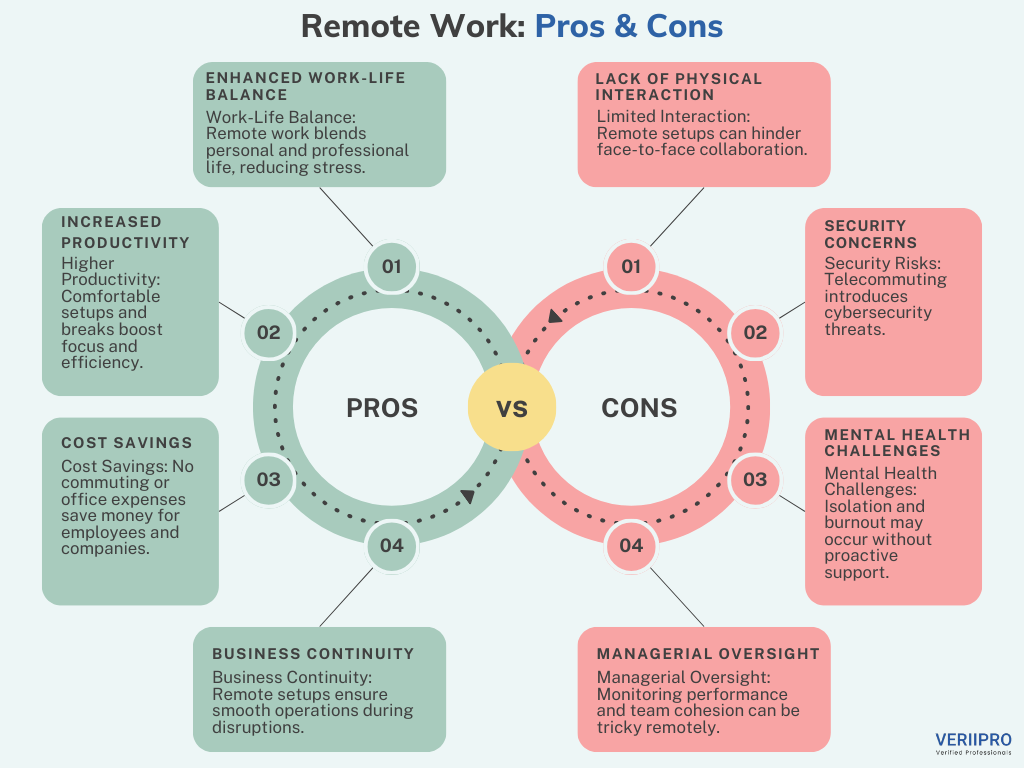Remote Work: Pros & Cons
The COVID-19 pandemic radically transformed global work culture, making remote work or Work from Home (WFH) a widespread necessity. As we navigate this new normal, understanding the nuanced benefits and challenges of WFH is essential for both individuals and organizations in an evolving job market. The shift to WFH has redefined the boundaries between office and home, creating new dynamics in how we work and interact professionally.

Advantages of WFH
To appreciate the full spectrum of remote work, it’s essential to consider its various advantages. These benefits not only cater to individual preferences but also align with broader organizational goals:
- Enhanced Work-Life Balance: WFH offers the flexibility to manage personal and professional responsibilities, leading to less stress and better overall well-being.
- Increased Productivity: Surprisingly, many have reported higher productivity levels at home. A familiar environment and the ability to take necessary breaks can significantly boost focus and work output.
- Cost Savings: Both employees and companies save money through WFH, with reductions in commuting expenses, office maintenance, and travel costs.
- Business Continuity: The pandemic underscored the importance of being able to keep operations running smoothly, regardless of external disruptions. WFH has been crucial in maintaining business continuity during tough times.
Disadvantages of WFH
While WFH presents numerous benefits, it also comes with its set of challenges that can impact the overall work experience:
- Reduced Physical Interaction: The shift to remote work means fewer in-person meetings, which can affect team collaboration, creativity, and the natural flow of ideas. The absence of spontaneous interactions can sometimes hinder the brainstorming process and the building of stronger team bonds.
- Security Concerns: WFH increases exposure to cybersecurity threats like data breaches and phishing. It’s vital for organizations to strengthen their cybersecurity protocols and ensure their employees are well-trained to handle these risks effectively.
- Mental Health Challenges: The isolation from prolonged remote work can lead to loneliness and burnout. Active efforts in maintaining regular communication and building support systems are necessary to safeguard mental health.
- Managerial Oversight: Monitoring performance and maintaining team unity can be more challenging remotely. Utilizing effective communication tools and establishing regular check-ins can help overcome these obstacles.
CONCLUSION
Embracing WFH brings significant benefits, such as improved work-life balance, productivity, and cost savings, alongside challenges in interaction, security, and mental health. As we continue to adapt to this changing landscape, recognizing and navigating these aspects effectively is key to leveraging the full potential of remote work in today’s dynamic job landscape. Businesses and professionals must remain agile, embracing the advantages while strategically addressing the challenges to thrive in the era of remote work.
If you’re ready to embark on your IT career journey, explore the limitless opportunities at VeriiPro and find your perfect match today!




